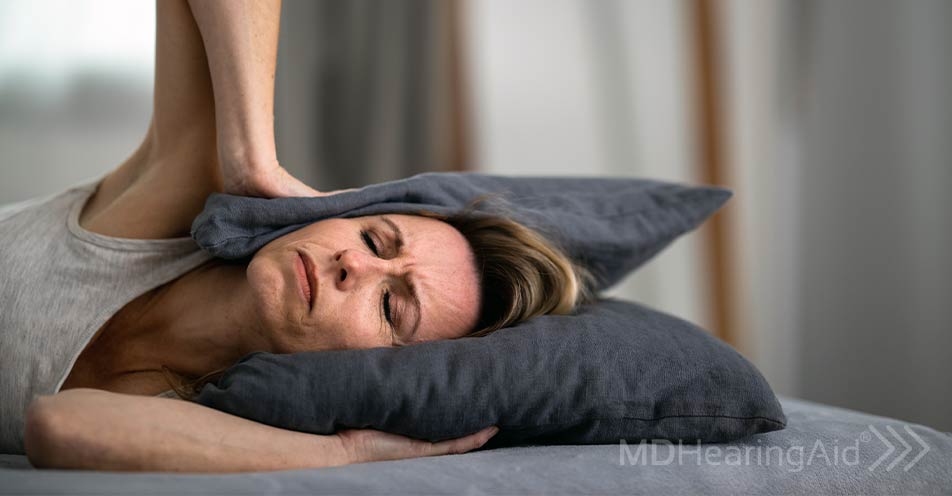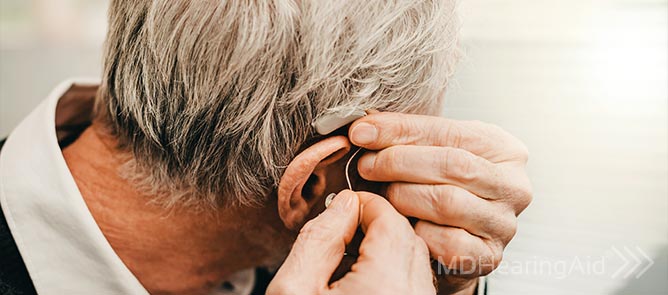Today’s guest author is Dr. Ben Thompson, Au.D. He is the founder of Treble Health, an online telehealth clinic. He is here to explain what he has learned over the years as a tinnitus expert.
The most effective tinnitus treatment depends on an accurate diagnosis by your doctor. Tinnitus can have many causes. Successful treatment will address the root cause.
Treating tinnitus is not always easy, and it doesn't happen overnight. But often you can reduce the volume of your tinnitus, and your perceived annoyance from it.
In this article, we will explore today's most validated tinnitus research. We will answer the question, “What is the most effective treatment for tinnitus?”
Tinnitus Overview
The most common causes of tinnitus are hearing loss, loud noise exposure, ear infection, ear injury, and medications.
Sometimes tinnitus has a very simple cause like ear wax or ear infection. With proper medical intervention, tinnitus can improve fast. Unfortunately, most kinds of tinnitus have a longer timeframe to heal and get better.
About 50 million Americans have tinnitus, and 90% of them also have hearing loss. Tinnitus is the number one symptom of hearing loss.
This article will focus on how to treat tinnitus due to nerve-related hearing loss.
There's no surgery, pill, or cure to make tinnitus completely go away. The best way to treat tinnitus is to focus on management techniques that research shows work for most people.
What Is The Most Effective Treatment For Tinnitus?
The best tinnitus treatments use a systematic protocol. The best protocols are Tinnitus Retraining Therapy and Progressive Tinnitus Management.
The most effective way to treat tinnitus involves psychology and sound.
First, your psychology. Tinnitus can trigger a fight-or-flight response in your psychology, which then sends a signal back to the tinnitus and makes it louder.
Second, using sound can help you. When setting your sound-rich environment, the sounds do not need to be very loud. You can listen to soft, constant noise throughout the day.
This creates a sound-rich environment, which sends a signal to our auditory system that the tinnitus noise is not a threat. It's like any other type of noise.
Different Treatment Options
1. Progressive Tinnitus Management
Progressive Tinnitus Management (PTM) is the most evidence-based treatment system. It was created in 2005 by the Veterans Health Administration in the United States.
Military veterans have a high prevalence of tinnitus from their loud noise exposure during service. Decades of government funding went into research to help individuals with tinnitus.
Progressive Tinnitus Management has different levels of patient care. Each level of care gets more hands-on and individualized. That means those who are having the biggest problems get the help they need.
At the beginning, participants start in a group education program. They learn the basics about psychology and at-home sound therapy.
The next step is more individualized care. This involves an appointment with an audiologist. The doctor performs a hearing test. They also explain how hearing aids may be helpful to manage tinnitus.
Additionally, an individual may have an appointment with a psychologist. They perform talk therapy to help with anxiety and stress from tinnitus.
Progressive Tinnitus Management recommends using nearly constant sound therapy. When you're in a quiet place, have some relaxing background sounds. Then, you're not hearing the loud tinnitus all the time. You are less likely to go into a downward spiral of focusing on it.
Most individuals with tinnitus enjoy wearing hearing aids. If you have a hearing loss, then hearing aids will help with hearing loss and tinnitus. You can take this online hearing test to check your hearing today.
2. Tinnitus Retraining Therapy
Tinnitus Retraining Therapy (TRT) is another evidence-based treatment protocol. An audiologist uses the brain-to-body model of tinnitus to help you. It was created in 1995 by Pawel Jastreboff.
Non-auditory parts of the brain can change the sound of tinnitus. Not only the auditory system, but the emotional brain and the nervous system as well.
The main goal of Tinnitus Retraining Therapy is to reduce negative reactions. When performed, reduction in the tinnitus volume can happen.
The negative reactions to tinnitus can come from the mind and the body. Negative reactions in the body include stress, loss of sleep, and an increase in stress hormones. Negative reactions in the mind include anxiety and loss of concentration.
The second aspect of Tinnitus Retraining Therapy is to use sound therapy. This is performed via hearing aids, ear level noise generators, or soothing sounds in your environment.
I work with tinnitus patients via tele-health. I have seen Tinnitus Retraining Therapy work. It focuses on hearing aids, anxiety, and stress. Psychology is an important factor in tinnitus care.
Tinnitus Retraining Therapy is 80% effective in the treatment of tinnitus patients.
3. Cognitive Behavioral Therapy
Cognitive Behavioral Therapy (CBT) helps individuals in reducing the negative impact of tinnitus. A therapist helps address the root cause of some forms of bothersome tinnitus.
Many individuals with tinnitus have chronic anxiety and stress. A therapist can help improve your sleep, energy levels, and quality of life. When you have less anxiety and stress, then tinnitus may become less of a problem in your life.
Do Hearing Aids Help Tinnitus?
Hearing aids provide significant relief for most individuals who have tinnitus, especially if you have a hearing loss and are struggling with tinnitus. The first step to understanding your hearing health is to take an online hearing test.
Hearing aids provide amplification and ear-level sound therapy. Sometimes, headphones can help with tinnitus. For most people, using hearing aids for sound therapy is easier.
The major function of hearing aids is amplification of the sounds around you. Hearing more sounds in your environment can help tinnitus. The volume of tinnitus is typically softer when you are wearing hearing aids.
It is also important to understand the effects of untreated hearing loss. This may include social isolation and speech understanding difficulty, among others.
Tinnitus Masking (Sound Therapy)
Hearing aids that have tinnitus masking can provide benefits to someone with tinnitus. Another name for tinnitus masking is sound therapy. Many hearing aids have the option to create a masking or sound therapy program.
Tinnitus usually sounds softer while you are listening to the masking sounds. This can help you keep your concentration and calm during the day. Sound therapy can come from a program inside your hearing aids or by connecting your hearing aids to a smartphone via Bluetooth.
Creating a sound-rich environment is key to help manage tinnitus long-term. If you are looking for an in-depth review of sound therapy, check out this video I made below:
Are There Any New Treatments For Tinnitus?
Every few years, researchers test new tinnitus treatments. For example, one research group is investigating a neuromodulation device for tinnitus. Another research group is studying if hearing cells of a damaged cochlea can be regrown. This may reduce tinnitus for individuals with nerve-related hearing loss.
The best tinnitus treatment in 2021 includes hearing aids and cognitive behavioral therapy.
Does Medicare Cover Tinnitus Treatment?
Unfortunately, Medicare insurance does not typically cover tinnitus treatment or hearing aids. Some supplemental Medicare insurance plans have partial coverage of hearing aids. It is important to do your research before tinnitus or hearing loss treatment.
Hearing aids can be expensive. If you are wondering how to improve hearing, then you have more options than just hearing aids.
Final Thoughts
Tinnitus can create anxiety, stress, and isolation. This article explained the most evidence-based treatment protocols for tinnitus management.
Remember, hearing aids alone are unlikely to treat tinnitus, but they can provide tinnitus relief. You also have other tools to help. To get started, contact an audiologist or a psychologist that specializes in tinnitus.
Via telehealth, Dr. Thompson provides services to patients with hearing loss and tinnitus. You can find him at https://treblehealth.com or on YouTube at Ben Thompson, AuD.
Want to test your hearing? Take our quick and easy online hearing test and get your results instantly.
TAKE ONLINE HEARING TEST

